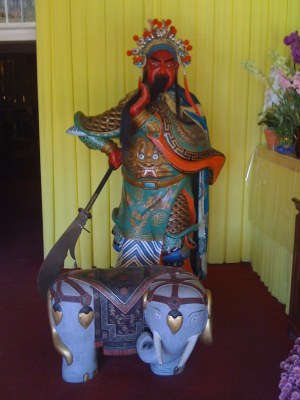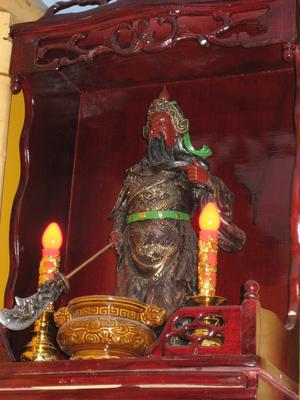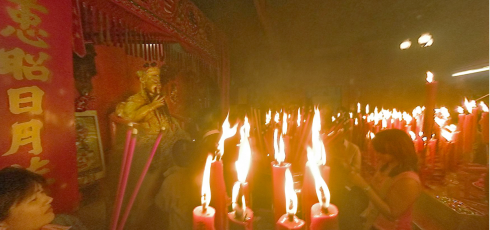Prasenjit Duara’s 1988 article “Superscribing Symbols: The Myth of Guandi, Chinese God of War,” published in The Journal of Asian Studies, provides an overview of the different myths told about the Guan Di over the course of more than a thousand years, as well as a theory to explain how the differences in these myths co-exist:
Myths are simultaneously continuous and discontinuous. I explore this relationship by examining the myth of Guandi through a concept that I call the “superscription of symbols.” […]
Is Guandi the protector of the Buddhist faith or a Chinese god of war? Whether we speak of them as conceptions of the spirit world or as embodiment of this-wordly interests, the two visions seem to have very little in common. (778-9)
Guan Yu was a historical figure in the late Han dynasty:
Guan Yu’s biography appears in the Sanguozhi (History of the three kingdoms), written by Chen Shou about sixty years after Guan Yu’s death (Chen 1973, 36:939-42). Chen Shou […] writes of Guan Yu’s friendship and devotion to Liu Bei of the royal house of the later Han.
Together with the butcher Zhang Fei, the two friends took the famous “Oath of the Peach Orchard” binding them to protect one another until death. Still later Guan Yu became a general and a governor of a province. Even though he was tempted by the enemy of his lord, Cao Cao, with a marquisate, Guan Yu remained faithful to his oath. In 220 A.D. He was captured by the enemy and put to death. (780)
His spirit appeared as an apparition to a Buddhist monk in the 6th Century CE:
One of the earliest miracle stories about Guan Yu is derived from a temple stele of 820 A.D. Erected when the Yuquan temple in Dangyang County in modern Hubei was reconstructed. Here, in the vicinity of Yuquan mountain, Guan Yu was decapitated during the long battle he fought against the enemies of his lord, Liu Bei.
One still night, when the Buddhist monk Zhi Yi (A.D. 538-97) was deep in meditation under a great tree on the mountain, the silence was suddenly filled by a booming voice: “Return me my head.” When the monk looked up he saw the ghostly apparition of a figure whom he recognized as Guan Yu, the spirit of the mountain.
An exchange followed between the two in which the monk reminded Guan Yu of the severed heads of Guan Yu’s own victims. Deeply impressed by the logic of karmic retribution, the spirit of Guan Yu sought instruction in the Buddhist faith from the monk, built a monastery for him, and began to guard the mountain. Later the mountain people built a temple to Guan Yu where they offered sacrifices at the beginning of each new season. (779)
This temple was built in 713 CE, and was affiliated with the nearby Buddhist monastery:
The earliest temple dedicated to Guan Yu is the Yuquan temple in Dangyang County in Hubei, where he is said to have been killed. This temple was established in 713 A.D. And was attached to the Buddhist monastery on Yuquan mountain. Over the next two hundred years […] his role as the Chinese protector of Buddhist temples (in place of the Indian devas) spread rapidly throughout the empire (Inoue 1941, no. 1:48).
Thus did Buddhism also become sinicized […] One may pause to consider the true direction of the acculturation process: did the Buddhists convert Guan Yu, or did he in fact make them a little more authentically Chinese? (781)
This question is an important one to consider, especially in light of subsequent “superscriptions” to the story of Guan Yu.

Buddhist Guan Di statue, City of 10,000 Buddhas.
For example, the Daoists quickly responded by claiming Guan Yu as one of their own:
It did not take long for Daoist temples also to adopt him as their protector god […] In Xiezhou in Shanxi, where Guan Yu was born, there is a famous lake called Salt Lake. In the Song a Daoist temple was established to Guan Yu at Salt Lake. According to the founding myth, a temple to the legendary Yellow Emperor had originally been built by the lake. However, soon afterward a demon who turned out to be Chi You, leader of the Miao tribes defeated by the Yellow Emperor, began to menace the area.
The Daoist Master Zhang was instructed by the imperial court to find a way to put an end to this desecration of imperial honor. The Master invoked the assistance of Guan Yu, who dispatched shadow (yin) soldiers to fight and vanquish Chi You. The temple was founded in order to thank Guan Yu and commemorate the event.
The founding myth of the Guan Yu temple at Salt Lake has all the ingredients of a Daoist legitimating myth: it draws on a potentially significant element of the story of Guan Yu—his birthplace—and combines it with the sacred geography and ancient history of China; with this as background, it identifies the imperial court as the patron of the Daoists who have successfully invoked the spirit of Guan Yu to restore the imperial honor. (781)
Later, Guan Yu gained both popular worship and imperial patronage (in 1615, he received the imperial title di). Duara devotes an entire section to “The Guandi Myth and the Imperial State,” but I’m going to skip that (for now) to focus on Guandi’s popularity among the populace:
It is well known that the spread of the worship of Guan Yu as a folk deity beyond the confines of sectarian religion was communicated in the vernacular novels and plays of the Song-Yuan transition. […]
Huang Huajie links Guan Yu’s growing popularity in the Ming (1368-1644) and the Qing (1644-1911) to the great socioeconomic changes of the era, which of course also enabled the popular media to spread. As the rural economy became increasingly commercialized, self-sufficient kin-based communities tended to disintegrate. In their place, settlements came to be composed of unrelated kin groups, merchants for whom sojourning had become a way of life, and marginal peoples without a community, such as vagrants and bandits.
None of these new groups was able to use bonds of kinship or community to hold the settlements together. As a symbol of loyalty and guardianship, the image of Guan Yu inspired an ethic of trust and camaraderie to hold together “a society of strangers.” (781-2)
Among both merchants and villagers, Guan Di was worshiped as a Wealth God. Like Zhao Gong Ming (whose worship seems to be linked to Guan Di’s), he was considered a military wealth god rather than a civilian one (789).
Among the bandits and secret societies, Guan Di’s association with oaths became paramount:
For the rootless bandits and rebels of secret societies, the oath of loyalty that Guan Yu upheld gained an unparalleled salience. All rites and ceremonies among the Triads, for instance, including those performed at the initiation of recruits and the punishment of traitors, took place before the altars of Guan Yu and the founders of the secret society. (782)
I discussed the complicated alliance and falling out between the Triads and the Christian-influenced Taiping Rebels in a previous post. Huang Huajie notes the Triads and other secret societies also fought against the Taipings on behalf of the hated Qing Dynasty, and theorizes on how this unlikely alliance came about:
Rural elites, led by the gentry, which mobilized the resistance and ultimately defeated the Taipings, were able to draw antistate secret society members into their local armies. Although monetary inducements were doubtless important in attracting the secret societies, Huang Huajie (1968:230) believes that the appeal to the image of Guandi was more significant. […]
For them, the oath symbolized loyalty to brotherhood, not to the state that had been their enemy. Yet under circumstances when it could be demonstrated that Chinese civilization itself was under attack by the foreign-inspired Taipings, the identification of Guandi with the nation and Chinese civilization, shaped to a great extent by the imperial state and the elites, could be mobilized in defense of the imperial order. After all, had Guandi not defended the house of Han from the rebellious Yellow Turbans? (789-90)
Speaking of Guan Di’s role in the suppression of the Daoist Yellow Turban revolt, I initially was hesitant about worshiping Guan Di for exactly that reason. However, I realized that the ability to be worshiped by diametrically opposed sectors of society and hold space for these contradictions–as long as his worshipers conduct themselves with honor and loyalty–is intrinsic to Guan Di’s widespread popularity.
This realization of mine fits in well with Duara’s thesis of the “superscription of symbols.” Duara recognizes that across all of these differing conceptions of Guan Di, two things remain constant:
[…] If a myth represents radically discontinuous meanings, if its symbols are pursued by particular groups only for their own particular purposes, how can it continue to impart legitimacy so widely across the culture?
On closer examination the two visions of the same figure have at least two common features: the apotheosization of a hero and his role as guardian.
This commonality is hardly accidental or insignificant. It is what gives the myth its legitimating power and gives historical groups a sense of identity as they undergo changes. (779)


July 28th, 2014 at 8:34 am
According to Taoism in china, the worship or veneration of Guan di was first adopted by paper merchants as a business patron as Guan di was a meat and beancuard seller before he became a general and his raising to a general was marked as a rise to prestige and protection for business travelling . Zhao Gong Ming commenced much earlier in early Zhou dynasty as he was a very successful general and the same is for the venration of third prince nezha who intervened and helped Jiang Zhi ya as sent by Tai shi or yuan shi, the great originator of the pridomal suprme force of the universe to quell the tyraany of the shang and The Zhou ruler then came into power. This is illustrated much later in the Ming dynasty divine chronicle folklore of the invester of the gods or Feng shen yan yi which depecits the legitimate rise to power to rule and an erly precedence to the legal mandotray judrisdicitive rise to power as predestined by the universial order of the legitimate appointed monarch to rule the people to establish Long term peace and prosperity . Thus the trend of venerating Generals and soldier spiirts for the protection of national welfare, legal jurisdiction and long term peace and prosperity of the nation predates to erly Zhou and Qin dynsty times . It continues still in the remote coastal towns of Wuzhen or black river towns of shang hai and Suzhou which are very ancient water towns by the Grand canal to Shanghai .
April 10th, 2015 at 1:07 am
[…] these types of contradictions are nothing new for Guan Di. I’ve quoted Duara extensively in a post on her essay at my own […]
July 26th, 2015 at 7:48 am
All people have needed a numinous figure, even the most depraved of us. That lawbreakers and lawmen can worships Guan Di is nothing new nor to be surprised about.
July 26th, 2015 at 9:21 am
I agree, even people as depraved as cops have a need for numinous protection.
But you’re right, this fact is neither new nor surprising, though it is often overlooked.
February 10th, 2016 at 8:45 pm
I would check your use of this scholar, Huang Huajie. The Taipings/洪秀全 found much of their inspiration in earlier salvation movements in imperial times. While on the surface their conservative appearance, egalitarianism, even their oecumenical rule may appear Christian, it actually has very separate origins. The Taipings had much more to do with the Yellow Turbans than with Christianity. The Taipings merely collapsed previous divisions (the monarchy, Confucian literati, secret societies, and foreign armies) by forcing them to unite and fight such a virulent threat. A sense of ‘Chineseness’ did not develop until really the very end of the Qing and the early 20th Century (and still developing). Guangdi may have played a role because of his martial prowess against the Yellow Turbans, as you noted, but certainly not employed to stop a ‘foreign’ threat.
February 16th, 2016 at 2:45 pm
Thanks for commenting. Any scholars you would recommend instead?